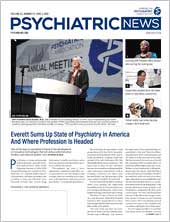“I could not be where I am today were it not for John Fryer and courageous people like him,” said APA CEO and Medical Director Saul Levin, M.D., M.P.A., during a discussion following the showing of “The 217 Boxes of Dr. Henry Anonymous” in New York on the evening before the start of APA’s 2018 Annual Meeting. He is the first openly gay CEO and medical director of APA.
The play celebrates the life of John Fryer, M.D., the APA member who catalyzed the removal of homosexuality from
DSM by announcing at the 1972 Annual Meeting while wearing a disguise that he was homosexual. (More information about the play is posted at
http://217boxes.com/.)
During a “Talk Back” session after the performance, Levin (second from left) was joined on stage by (from left) Malcolm Lazin, executive director of Equality Forum, an LGBT rights organization that produced the play; playwright Ain Gordon; and actor Derek Lucci, who plays the part of Albert Gross, a man who provided legal representation to gay men and befriended Fryer.
The “217 Boxes” refers to the personal correspondence of John Fryer stored in boxes—217 of them to be exact—at the Pew Center for the Arts and Heritage and the Pennsylvania Historical Society, located in Philadelphia. Playwright Gordon, working on a grant from the Pew Center, knew nothing about Fryer when he arrived but found in those boxes the source of his next inspiration and a life that he could unpack.
In “The 217 Boxes of Dr. Henry Anonymous,” Gordon draws a portrait of Fryer through the personification of three characters who were prominent figures in the archives: Alfred Gross, a social activist with whom Fryer collaborated to help gay men who had been arrested in bars or elsewhere for homosexual conduct; Fryer’s secretary, who elaborates on Fryer’s therapy with men who were ill with HIV/AIDS in the 1980s; and Fryer’s father.
Fryer’s father had never acknowledged Fryer’s sexuality in his lifetime, but in “The 217 Boxes of Dr. H. Anonymous,” it is the father who reads aloud the speech Fryer delivered to psychiatrists in 1972.
The discussants after the show remarked that openly gay men and women of that time suffered severe consequences. Fryer was fired for being gay, as was Frank Kameny, who joined Fryer and gay rights activist Barbara Gittings at the 1972 Annual Meeting in Dallas. Others, such as Alan Turing, the mathematician who helped to break the Nazi codes during World War II, were chemically castrated.
“We owe the advances in LGBT rights today to the courage of people who came before us,” Levin said. ■

